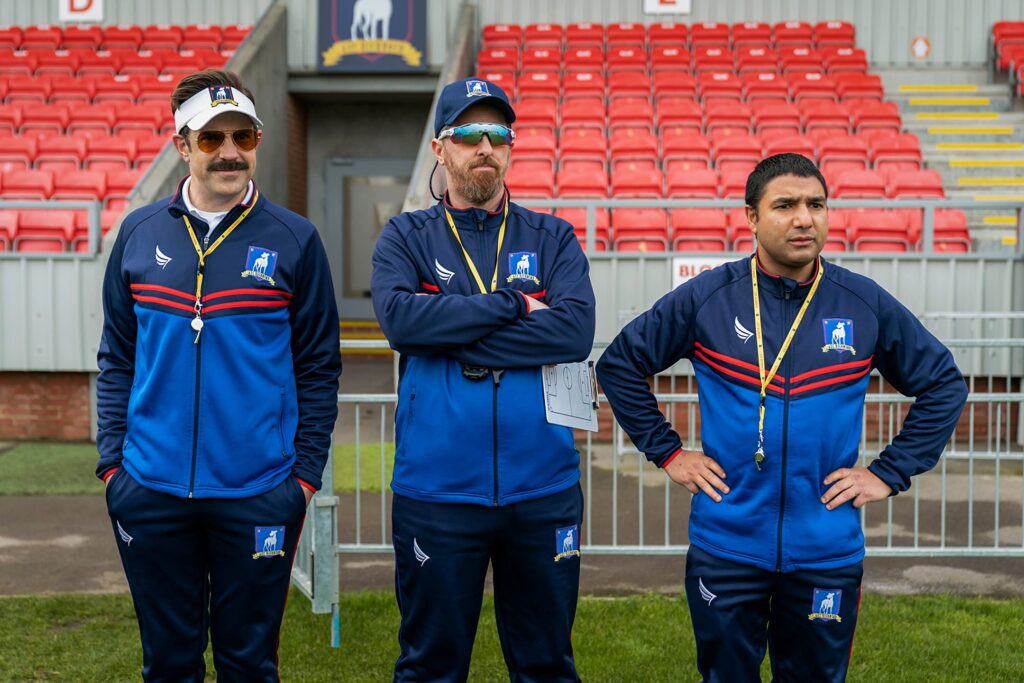In the series finale of Ted Lasso, former journalist Trent Crimm (independent) has given a draft of his book about Lasso’s improbable turn as the coach of the AFC Richmond football team to Lasso (and Coach Beard) for review. Beard’s copy is marked up with hundreds of color coded stickies and notes, but Ted just says he loves it… except for the title. Crimm had named the book “The Lasso Way” and Ted writes something to the effect of “It was never about me.” Which is in tune with the humble nature of the character for sure, but I can’t help but think it’s also speaking directly to the audience (or at least, me) about season 3’s relative dearth of the man himself.

The first season emerged in the midst of the pandemic (during a particularly contentious election year in the US), and its radically nice, wholesome tone was desperately needed. It was a nice antidote for the cynical times we were living in, and it was about as good as a season of sitcom television could be. It was a “fish out of water” story about a fundamentally decent guy beset on all sides by suspicious critics who slowly, methodically wins them over. And it was extremely funny! Season 2 faltered a bit, but even if I didn’t like some aspects, the disruption of the pandemic on the production was obvious and excusable, and while I didn’t love the idea or how they treated him, I respected the heel turn of a specific character to set up season 3.
However, the wheels pretty clearly came off the bus in season 3. It was as popular as ever, to be sure, but complaints and grumblings were more frequent. There’s a clear lack of cohesiveness here, almost like they had a plan, but scrapped it midway through the season to do something else. Introducing new characters and ideas only to unceremoniously drop them with nary a care to resolve them (except in maybe the vaguest of nods, as in Zava’s avocado or Keeley um, hmm, I don’t think they actually resolved anything there.) And the heel turn they so carefully crafted in season 2 was almost immediately backtracked (though this path, at least, represented an arc through the whole season.)
Then there’s this desperate grasping for relevance and a sweaty need to tackle Important Subjects (capital letters), a problem whose roots appeared in season 2, but which has grown into a mighty oak in season 3. It’s not the content itself, it’s the didactic way in which it’s delivered. Look, they’re good at packing the jokes in even as the show declined, but it was like each episode had to stop and do something resembling a corporate training video. Those videos you have to watch for corporate compliance purposes aren’t excruciating because they’re wrong; they’re so brutally didactic and ham fisted because the whole point of such a video is to reduce corporate liability, and trusting the audience to get the point of a metaphor or illustrative example is too vague for such purposes. This is not an approach to emulate for actual fiction, but then, here we are with season 3 of Ted Lasso. Alright, it’s not quite that bad. They are well crafted didactic speeches, but you know, still didactic.
This approach also had the effect of bloating the episodes to absurd lengths. Part of season 1’s charm was it’s economical use of the 30 minute (or so) runtime. This continued into season 2, but towards the end, they started moving towards double-sized episodes. Season 3 started off with a 43 minute episode, but most episodes ran towards the one hour mark, with the finale reaching an almost feature length 75 minutes. In the conversion to longer episodes something was lost. Trung Phan wrote about how great the introduction to Ted Lasso is in the pilot episode; it only takes 157 seconds to introduce the character and establish him as a likable guy. It’s also a perfect demonstration of the storytelling rule of “Show, don’t tell.” One of the reasons season 3 drags is that they’re not content to show, they also feel like they need to tell.
Lasso himself was largely absent from the proceedings throughout the entire season. This sort of thing happens on a lot of shows. They build up an ensemble of colorful side characters who eventually take over. Often times, the main character is the most boring of them all… but not in Ted Lasso. At least, not in season 1. And yes, the “fish out of water” tack can only last so long, but to have your main character sidelined for most of the season was kinda brutal. The last episode does fare better because we do finally get back to Ted, and his story goes basically the only place it could. As much as they might try to inoculate themselves with the “It was never about me” note, it was about him, and they seemed to forget that for a while. Ultimately, I’ve probably spent much more time on the negative here than was deserved. The show was still funny and worthwhile, but it seems undeniable that it lost its edge somewhere along the way there. (Well, this post started as a Tasting Notes sorta thing, but I guess I got carried away with trying to put my finger on what bothered me about season 3 of Ted Lasso so this has grown into its own thing… stay tuned for moar!)